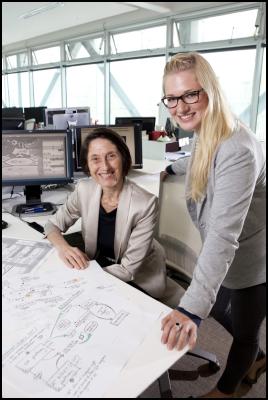Risk Factors Of Diabetes, Obesity And High Blood Pressure
Wednesday, 13 March 2013, 10:06 am
Press Release: University of Canterbury
UC To Investigate Risk Factors Of Diabetes, Obesity And High Blood Pressure
March 13, 2013
The University of Canterbury (UC) is this year looking to investigate the risk factors of diabetes, obesity and high blood pressure to understand the relationship they have with the genesis of Alzheimer’s Disease.
A UC bioengineering research team aims to provide a numerical model of the regulated blood supply with connected cells for the whole brain, which could model regulation of blood flow for a patient.
The project is being supervised by UC bioengineering professor Tim David and includes UC PhD student Katharina Dormanns and visiting Erskine Fellow from Harvard Medical School Dr Vera Novak.
The Erskine fellowship programme was established in 1963 following a generous bequest left by former distinguished UC student John Erskine. Dr Novak will give a public lecture on campus on March 26 about aging and diabetic complications in the brain
``We have developed complex computer models of cells in the brain that are connected together allowing the simulation of the regulation of blood flow to neurons. These cell connections play an important role in providing nutrients (oxygen and glucose) to the brain tissue,’’ Dormanns said today.
``When the regulation goes wrong there are a number of consequences. One of these is the generation of fibrils (made of protein) that cause neurons and other brain cell types to die, essentially the onset of Alzheimer's disease.
Advertisement - scroll to continue reading
``We know that there are a number of risk factors for those who eventually get Alzheimer's disease. Most notably diabetes, high blood pressure and obesity. These risk factors also cause strokes.
``Our computer models have the ability to scale up from single cells to millions of cells that are part of the brain tissue and the blood vessels that supply the blood to the brain. This would allow us to ultimately generate a patient specific model from a cellular level to the whole brain.
``We can do this using the IBM Blue Gene super computer, one of the biggest in the southern hemisphere that is here at UC. These models provide a way of simulating experiments in the brain that would either be too expensive or, more importantly, ethically and technically not possible,’’ Dormanns said.
Because of the complexity at the cell level the models can investigate the behaviour of individuals that have genetic variants as well as those risk factors noted above. The UC models provide a microscope into the living brain.
Professor Tim David said the Brains Trust Group at UC is at the leading edge of modelling neurological physiology and its impact on the ageing population. Professor David and his team have established an international reputation with the computer modelling of cell physiology and have collaborated with other researchers overseas.
``We can form a tool that predicts how the whole arterial tree in the brain can react to varying environments, such as high or low blood pressure or the inhalation of too much carbon dioxide.
Death of brain cells through lack of blood is the third greatest cause of death and the single greatest cause of disability in New Zealand. This week is New Zealand’s annual Brain Week,’’ Professor David said.

Photo: Vera Novak (left) and Katharina Dormanns
ENDS
Advertisement - scroll to continue reading
a.supporter:hover {background:#EC4438!important;} @media screen and (max-width: 480px) { #byline-block div.byline-block {padding-right:16px;}}
Using Scoop for work?
Scoop is free for personal use, but you’ll need a licence for work use. This is part of our Ethical Paywall and how we fund Scoop. Join today with plans starting from less than $3 per week, plus gain access to exclusive Pro features.
Join Pro Individual Find out more
Find more from University of Canterbury on InfoPages.